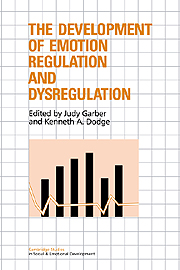Book contents
- Frontmatter
- Contents
- List of contributors
- Preface
- Part I Introduction
- Part II Early development
- Part III Physiological regulation
- 6 Vagal tone: An autonomic mediator of affect
- 7 Marital discord and child outcomes: A social psychophysiological approach
- Part IV Cognitive regulation
- Part V Psychopathology
- Part VI Integration
- Author index
- Subject index
7 - Marital discord and child outcomes: A social psychophysiological approach
Published online by Cambridge University Press: 26 March 2010
- Frontmatter
- Contents
- List of contributors
- Preface
- Part I Introduction
- Part II Early development
- Part III Physiological regulation
- 6 Vagal tone: An autonomic mediator of affect
- 7 Marital discord and child outcomes: A social psychophysiological approach
- Part IV Cognitive regulation
- Part V Psychopathology
- Part VI Integration
- Author index
- Subject index
Summary
It has long been recognized that marital and family relationships affect the adjustment of developing children. Observations of the suffering and confusion of children whose parents continually disagree have been corroborated generally by research findings of powerful familial correlates of young children's adjustment. Indeed, the best familial predictor of childhood behavior problems has been found to be marital discord (for a review, see Emery, 1982).
Less clearly understood are the processes by which characteristics of the marital relationship come to affect children. Many questions remain unanswered. For example, is marital conflict that children observe worse for their adjustment than unobserved conflict is? One of the best predictors of physical spouse abuse is a report of having seen one's own parents be abusive to each other, regardless of whether they were abusive to their children (Dutton, 1987). We also do not know whether children are affected by marital dissatisfaction because there has been a change in the quality and/or quantity of the parent-child contact or whether negative consequences can occur independently of the parent-child relationship. For example, perhaps just having a depressed mother or a withdrawn father can change a child's interpersonal behavior.
Nor have the exact consequences of marital discord for children been clearly outlined. Such varied symptoms as depression, withdrawal, acting out, and aggression have been observed (Hetherington, Cox, & Cox, 1978; Porter & O'Leary, 1980). It is not clear, however, whether marital discord disrupts one central developmental process or several different processes.
- Type
- Chapter
- Information
- The Development of Emotion Regulation and Dysregulation , pp. 129 - 156Publisher: Cambridge University PressPrint publication year: 1991
- 31
- Cited by

